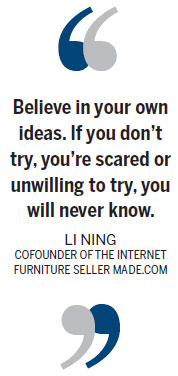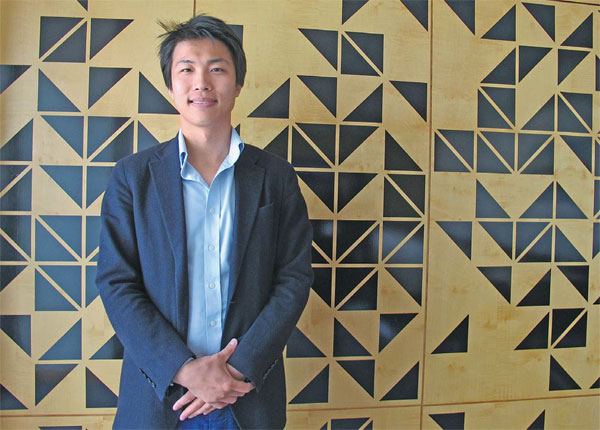He who dares, sells tables and chairs

| Li Ning, co-founder of Made.com, gained a lot of experience of doing business in the furniture manufacturing industry. Zhang Chunyan / China Daily |
Li Ning has given a new, highly profitable twist to home furnishings retailing in europe
In the land of Ikea, the Allen key is king. Next to that nifty tool, one that millions of the furniture retailer's customers worldwide have used to assemble their purchases, another of Ikea's trademark characteristics is the sprawling retail buildings it builds to hold the goods it sells.
Thus has the Swedish company built an international business that celebrated its 70th birthday last year, with the icing on the cake being turnover of $28.5 billion (21 billion euros).
But times have changed, and the Ikea business model may be beginning to show some wrinkles.
Someone who has come up with a model that throws many of Ikea's idea's out the showroom window is Li Ning, 36, a cofounder in London of the Internet furniture seller Made.com. The company's modus operation is summed up on one of its websites: "We cut out unnecessary costs and connect you to the makers."
That means no more Allen keys, or any other tools for that matter. Perhaps more importantly, the huge costs imposed by the storage and retail space that Ikea is forced to use evaporates.
You need look no further than Made.com's sales performance to be convinced that this new way of selling furniture seems to be working. In the past two years they have tripled, Li says, although he refuses to divulge the figures. The company was set up just four years ago, and has established a firm presence in the home furniture and fittings markets in Britain and France, and it now employs more than 160 people, between 130 and 140 of them in London and the rest elsewhere, including China, Li says.
The fact that Made.com is not a furniture company given a Johnny-come lately computer makeover to keep up with rivals but rather has e-commerce in its genes is clear from the way it obtains its services: crowd sourcing. In practice that means it gives designers the chance to submit their designs for public exhibition. On the website, the public cast votes for the furniture, and the most popular items are then put into production.
"The way we work is to form partnerships, which means the partner commits to only one container load of any one design," Li says.
"When a product works well, we order more and everyone wins."

Underlying Made.com's sales pitch is that it is selling trendy, upmarket designer furniture and other goods at affordable prices. The company says it aims to keep its prices at 70 percent lower than those of conventional retailers such as John Lewis, Habitat and Bo Concept.
Most of what Made.com sells is made in more than 50 locations in China and some in southeast Asia, Li says.
The company commissions designs for beds, chairs, tables, lighting and other furniture, which are then displayed on its website. Items are produced only after a customer has placed an order, and the goods are then shipped from the factory to customers.
"The way we work is to form partnerships under which the manufacturer commits to only one container load of any one design. When a product works well, we order more, and everyone wins."
With minimal storage required, and with no expensive High Street shops, costs can be kept down and the savings passed on to customers, Li says.
Li was born in Foshan, Guangdong province, China's main manufacturing center for furniture. He went to high school in France when he was 16 and later graduated from the European business school HEC in Paris (Motto: "Learn to dare").
After working for a total of more than two and a half years in investment banking, for Rothschild & Co in Paris and Hong Kong, and then as an Asia manager for the dating website Meetic, Li decided to set up his own company, feeling dissatisfied with his career in finance and wanting "the freedom and creativity to thrive".
In 2007 he set up his own company, MyFab, a furniture retailer, in Paris with a business model similar to that of Made.com, sourcing products directly from factories.
After a degree of success with Myfab.com, he met Brent Hoberman, a co-founder of the pioneering online travel website lastminute.com and of the innovative home decorating site mydeco.com. Together they decided to improve on Li's Myfab.com model by setting up Made.com in Britain in March 2010, and they raised 2.5 million pounds ($4.3 million; 3.1 million euros) for the launch.
The British economy was then showing fitful signs of emerging from the worst of the economic crisis, and demand for well-designed furniture was recovering, but conventional suppliers were having to face at least one harsh reality: the huge expense of warehouse and retail space.
Analysts say Made.com has been helped by the fact that British shoppers are used to waiting for one or two months for high-end furniture to be made and delivered.
"We invested heavily in an IT system to overcome the risks associated with made to order," Li says. "This makes it one of the largest entry barriers for competitors, allowing us to automate as much as possible and reduce errors."
Li says he has grown with the company in the past four years.
"We face new challenges everyday and often make mistakes... But we are learning and growing."
At the start he attended to everything personally, he says, but he realized he needs to delegate and manage the company in a systematic way.
One of his bugbears is hiring and firing and he is not a big fan of formal meetings, so he has got into the habit of making these on-the-run, stand-up affairs.
After Made.com's success in Britain, it opened in France in February last year. In the world of e-commerce, making such a move is relatively easy, Li says. Apart from organizing the logistics in the new territory, it may mean little more than translating a website and setting up a payments system.
"The retail industry in UK is quite competitive compared with other parts of Europe. It's easier to pick up business in other European countries because of our three years' experience in such a competitive environment."
The biggest problem for Chinese companies wanting to set up in Europe is one of culture rather than money or markets, he says.
"We hired a wide range of international staff, British, French, Italian and Chinese. So before going beyond Britain we already had a very multicultural team in place."
The company is trying to shorten the time customers need to wait for their deliveries, he says.
"At first, the whole process lasted 12 to 14 weeks, and now it's four or five weeks. That is still not ideal, but we don't lag behind our competitors."
Made.com wants to gradually move into Germany and northern Europe, he says. For him, such expansion comes down to having faith in yourself.
"Believe in your own ideas. If you don't try, you're scared or unwilling to try, you will never know."
Zhou heran contributed to the story
zhangchunyan@chinadaily.com.cn
(China Daily European Weekly 07/11/2014 page20)
Today's Top News
- New engine powers cargo drone expansion
- China to boost intl cooperation on green tech
- Factory activity sees marginal improvement in November
- Venezuela slams US' 'colonial threat' on its airspace
- Xi: Strengthen cyberspace governance framework
- Takaichi must stop rubbing salt in wounds, retract Taiwan remarks































